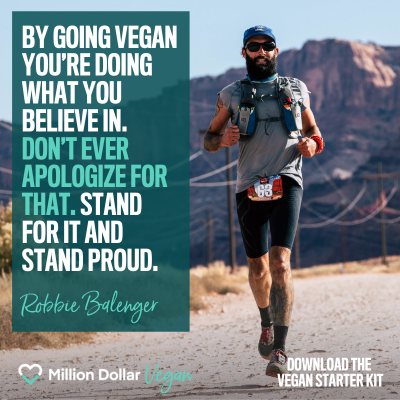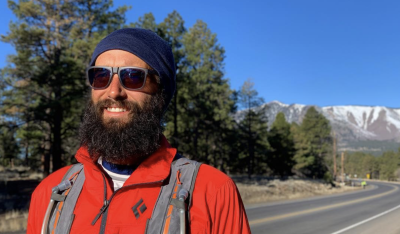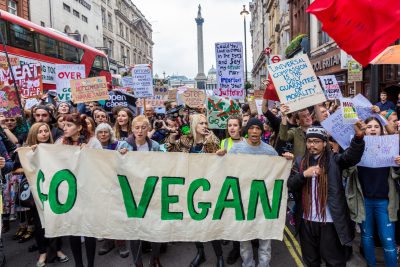On March 16th, vegan athlete and ultra-runner Robbie Balenger set off on the challenge of a lifetime: a 3,200 mile run across the United States, coast to coast from Los Angeles to New York. Why? To show the world that even endurance athletes don’t need to consume animal products to be at the top of their game.
Over the course of 75 days, Robbie is running approximately 45 miles per day (that’s almost two marathons), fueling himself on a plant-based diet and, he readily admits, plenty of vegan ice cream!
This grueling challenge has been completed by fewer people than have climbed Mount Everest, but Robbie says he feels empowered and motivated to succeed because he will be inspiring others by doing so.

Before he took off, we asked Robbie a few questions.
Were you always interested in running and fitness?
I wasn’t always into running but I was interested in athletics, and predominantly American football. Even so, there was a real lag in that during my university years where I drank a lot of beer and worked in the restaurant and bar industry. I had a real ‘work hard, party hard’ lifestyle and didn’t really know anything about nutrition.
So when did all that change?
Well, about six years ago my fiancée Shelley convinced me to go on my first two-mile run and, from there, it’s been an incredible journey of pushing boundaries and discovering who I am, in the same way that veganism has been.
The first time I actually understood the effect that food choices could have on my body was watching Super-Size Me. That documentary was a revelation for me and it was then that I started to take an interest in nutrition.
What was your first ultra-run like?
My first marathon was challenging, and a steep learning curve. After that I did a 50km race in preparation for 56-mile (90km) race called The Cruel Jewel, which was in 2016. Each race was much harder than I expected it to be. Every step of the way you’re pushing your threshold, but it teaches you that with enough determination, almost anything is possible.
What made you want to run 3,200 miles across the US?
I’ve always been interested in environmentalism, and in doing something to protect the environment. Coming out of my career in the restaurant industry, I was actually thinking of becoming a wildland firefighter, but then I just kept asking myself: when will I get time to run?
I wanted to find a way I could combine both of my passions.The answer came during the Ultra Caballo Blanco race in the Copper Canyons of Mexico. By running alongside the native-Indian inhabitants (the Tarahumara – who run in sandals) we raised money to provide crop seeds and funds for them, helping to provide both nutrition and support for their physical and cultural survival.
At that time I was vegetarian but starting to explore veganism, and I met vegan ultrarunner Patrick Sweeney. Patrick had already run across the country and he was doing what he loved without compromise: promoting the environmental and health benefits of a plant-based diet through his passion.
Doing that race and meeting Patrick made me feel that running for a cause could be possible for me too. This was also when I also realized that animal products are not needed for performance, and that rather than helping you, they’re actually hindering you.
Was it easy to switch to a vegan lifestyle?
I approached veganism in the same way I’ll approach my run across America: one day at a time.
I had to kick a lot of bad habits to get there. Cheese was probably the hardest thing to give up, but once I made the switch, the effects were so profound from a performance standpoint that I actually stopped desiring cheese altogether because I knew how it would make my body feel.
A good analogy for that is when you drink too much alcohol, and then you never want to drink that alcohol again because you haven’t forgotten how awful it made you feel. Things like ‘meat sweats’ and feeling bad and bloated after eating animal products is something you might not notice now, but you definitely notice the difference when you remove them.
Are the main drivers behind your vegan lifestyle still health and the environment?
No, I’d say that ethical reasons are now the strongest driver behind my veganism, alongside the environment. I still care about my health, but I care more about the future of this planet and the animals.
The future generations that will be affected by the choices we make, and the animals who suffer horrendously for them, don’t get to make the choice for themselves. It is with those that don’t have a choice that my empathy lies.
How do you feel about the trend towards eating meat?
There’s no good reason for animals to be harmed or killed, but we spend our whole lives being conditioned towards eating them, so it’s a difficult change for most people to get their minds around. Also, there’s a lot of misinformation being thrown around and so many diet fads out there, that it makes it hard for people to determine what’s good for them and what isn’t.
I think many see veganism as “just another fad” but I’m going to prove that this isn’t the case. I think that providing real examples is a great way to get people to open their minds to veganism, and hopefully this run will do just that.
Also, I think people are afraid of failing at veganism. My advice to those people is to still try: celebrate small victories, let go of defeats, and eventually you’ll be able to do what you set out to do and be who you want to be.
What are the changes you’ve noticed in yourself and your fitness since going vegan?
I’ve been vegan for just under a year now and I no longer experience inflammation in my joints, which can be a big issue for runners. My recovery time from running events is quicker, and I also just feel lighter and cleaner.
From an ethical and spiritual standpoint, I feel good about my food choices now. It’s a nice feeling to wake up each morning knowing that you’re doing something for the good of the planet, the animals and your health. That definitely improves how I feel about myself, and that’s an important thing to remember when people tell you that one person ditching animal products won’t make a difference.
What do you eat on a normal day?
I like my coffee in a morning, and I usually make a smoothie as well, with bananas, carrots, peanut butter, kale, almond milk or coconut milk, and some water. Instead of eggs, I enjoy tasty tofu scrambles. I also like to make something called a “Slacker’s Banquet” which is essentially rice, beans, diced avocado, tomatoes, onion, and anything else you want to throw in there. I eat lots of legumes, and make a mean chana masala!
What’s your all-time favorite meal?
I love Scott Jurek and his book Eat & Run. The veggie burger recipe in that book is perfect! If I’m after something sweet, then it’s NadaMoo ice cream all the way.
We’re never getting away from how much people love things like hamburgers and ice cream, so being able to find comparable plant-based equivalents is key. Vegan alternatives to meat and dairy are getting better every day, and I think plant-based food technology holds great promise for a sustainable future.
How do you feel about the stereotype that “eating meat is manly”?
This is definitely something that exists. Where I grew up, being a ‘real man’ who eats meat and doesn’t show emotion was something to aspire to, but I tried that and it didn’t work—I just felt worthless all the time.
When I started to meet ultra-runners for the first time, I realized that steadfast determination, optimum health and ultra-athleticism were what I saw as masculinity, and what I wanted to aspire to.
I hope that men can start to redefine masculinity for themselves through what they’re seeing me accomplish on a plant-based diet, and I hope that women will be inspired too.
It’s sad that showing compassion is not considered to be a masculine trait, because it should be. It should be a basic human trait, common to men and women alike.
What words of advice would you give to someone considering a vegan lifestyle?
It’s a great thing to be vegan, so go vegan and be proud!
I met this vegan runner during a race in Arizona once and I told him how I was always worried about inconveniencing people or offending people with my veganism. He pointed to his neck, which had the word ‘VEGAN’ tattooed across it.
“If you’re doing something you believe in,” he said, “stand for it and stand proud.”
If it means you go without a meal every now and then, or you end up putting someone out—so be it. Deal with it eloquently and politely of course, but stand by your beliefs. By showing conviction in your choices, a lot of positive impact can occur.
Is there anything you regret about going vegan?
Hell no!
My goal is to inspire people all across this country to start paying more attention to what they put inside of their bodies, and to be an example of someone who has made a radical change and feels better for it. For the next 75 days while I’m running across America, that’s exactly what I’ll be doing!
Million Dollar Vegan wishes Robbie Balenger all the success he deserves in his challenge of a lifetime!
If you’re inspired by Robbie’s story, then download our free Vegan Starter Kit here.
You can follow Robbie’s incredible journey via his Instagram page: @robbiebalenger




